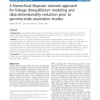129 search results - page 2 / 26 » Tightness Time for the Linkage Learning Genetic Algorithm |
114
Voted
CEC
2005
IEEE
15 years 6 months ago
2005
IEEE
This paper presents a modularization strategy for linear genetic programming (GP) based on a substring compression/substitution scheme. The purpose of this substitution scheme is t...
107
Voted
GECCO
2000
Springer
15 years 4 months ago
2000
Springer
This paper gives a theoretical and empirical analysis of the time complexity of genetic algorithms (GAs) on problems with exponentially scaled building blocks. It is important to ...
155
Voted
BMCBI
2011
14 years 4 months ago
2011
Background: Discovering the genetic basis of common genetic diseases in the human genome represents a public health issue. However, the dimensionality of the genetic data (up to 1...
95
Voted
GECCO
2006
Springer
15 years 4 months ago
2006
Springer
We present two novel perturbation-based linkage learning algorithms that extend LINC [5]; a version of LINC optimised for decomposition tasks (oLINC) and a hierarchical version of...
96
Voted
GECCO
2008
Springer
15 years 2 months ago
2008
Springer
This paper empirically investigates parallel competent genetic algorithms (cGAs) [4]. cGAs, such as BOA [21], LINCGA [15], D5 -GA [28], can solve GA-difficult problems by automati...

